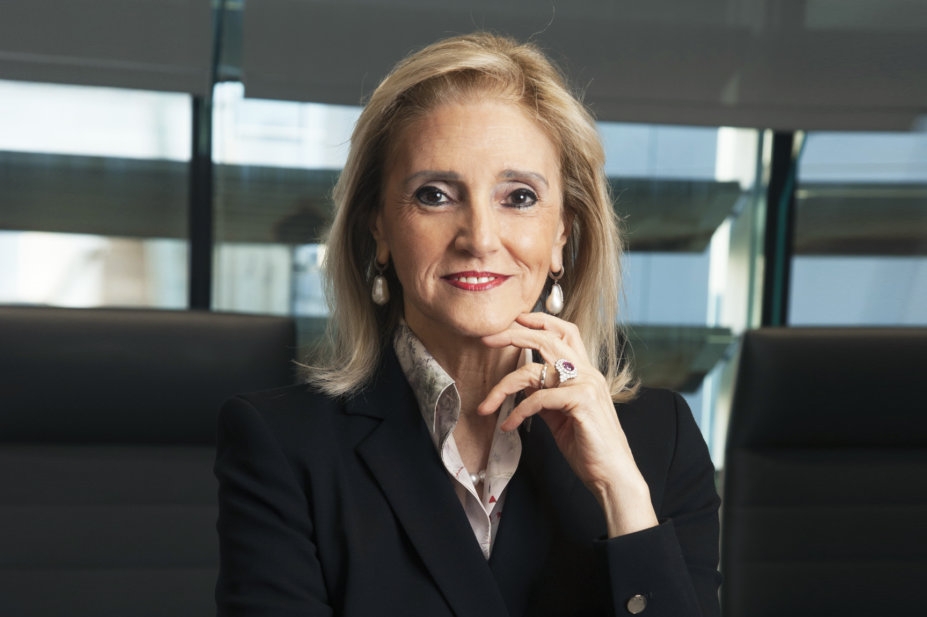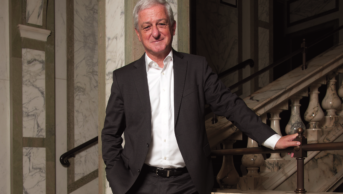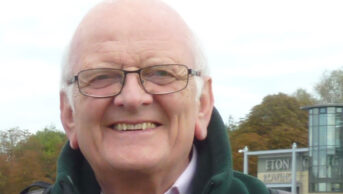
Charlie Milligan
As a child, Ornella Barra was fascinated by the medical field. She initially contemplated a career as a surgeon, but her family urged her to reconsider and follow a profession that would be better suited to her personality and life goals. In April 2019, 45 years after deciding to pursue pharmacy, Barra is co-chief operating officer of Walgreens Boots Alliance (WBA), the first global, pharmacy-led, health and wellbeing enterprise.
Why did you choose community pharmacy as a career?
I chose this path because pharmacy is part of my DNA. Although I initially wanted to become a surgeon, it was difficult for women to succeed in that specialty at that time.
I was a motivated and determined young woman and wanted to be the architect of my own fate, so I decided to pursue pharmacy — a field similar to medicine but where I felt I had more chance of fulfilling my ambitions.
I was intrigued by the many facets to a pharmacist’s role: medicines expert, adviser and patient health advocate, while also being an entrepreneur and business manager, developing activity through ideas, innovation and collaboration. I have always been a very dynamic and curious person so it was the perfect role for me.
I enjoy developing our company’s activities and culture, and facilitating change
Can you describe your career history to date?
In 1979, I graduated from the University of Genoa, Italy, with a degree in pharmacy and began my career as a community pharmacist in nearby Chiavari. I was young and full of initiative, with many ideas of how we could improve the store. Soon, my boss asked me to manage the pharmacy.
Eventually, I set up my own pharmacy, while at the same time studying and analysing the pharmaceutical distribution market. I noticed there was room for improvement, so I started my own distribution company — DiPharma — in 1984.
I wanted my project to grow on a larger scale but realised this initiative would be a large undertaking. I had to be proactive but pragmatic in my approach so I started looking for a business partner, a colleague or another entrepreneur who shared the same views. I met Stefano Pessina, the current executive vice chair and chief executive officer of WBA, who was developing his own distribution company at the time.
Stefano and I had a common vision and complementary approaches to business and, in 1986, we combined our respective companies. Stefano is one of the best deal makers, if not the best. I have followed our company’s evolution playing a different role in the business to Stefano, holding several roles and responsibilities as a member of the boards of directors for our legacy companies. He is the architect and I am the engineer.
Together, we gained a significant share of the market and became the fastest growing pharmaceutical wholesaler in Italy. In 1991, the company expanded into Europe, combining with two companies in France to create Alliance Santé, and forming a partnership with UK’s UniChem. Only six years later, in 1997, the two merged to form Alliance UniChem — a pan-European leader across wholesale and retail with a presence in more than 12 countries.
In 2006, we merged with the Boots Group and, in 2012, Alliance Boots entered into a strategic partnership with Walgreens, the largest pharmacy multiple in the United States.
In December 2014, the two companies merged to create WBA — the first global, pharmacy-led health and wellbeing enterprise. Today, WBA has more than 18,500 stores in 11 countries and it is one of the largest global pharmaceutical wholesale and distribution networks.
In June 2016, I was appointed co-chief operating officer of WBA. My responsibilities include oversight of the retail pharmacy international businesses outside of the UK, Ireland and the United States, as well as the pharmaceutical wholesale division, global brands, human resources (HR), corporate social responsibility (CSR), communications and corporate affairs and — with Alex Gourlay, co-chief operating officer of WBA — global IT, supply chain, marketing and commercial activities.
What do you enjoy most about your role?
I’m a very pragmatic and proactive person so I enjoy developing our company’s activities and culture, and facilitating change. I don’t like the status quo. Instead, I seek to understand the future direction of our company to be a pioneer in the field.
When problems arise it’s important to remain calm, put the problem on the table, work to find a solution and move on
What do you find most challenging about your job?
I am extremely passionate about what I do, but this often means I am very demanding of myself and my team. I am a perfectionist and hold high standards for both myself and those around me. But I know it’s impossible to achieve perfection all the time, especially in a company with more than 415,000 employees in more than 25 countries.
When problems arise it’s important to remain calm, put the problem on the table, work to find a solution and move on.
How have you overcome some of the obstacles that women might face in business?
We all face obstacles during our careers — but it is true that women must “play harder” in many cases. I have always been very determined and clear about my views, which has helped me overcome this obstacle. I think women have incredible resources that should be utilised more fully. Despite many efforts to support female leadership, progress is still limited, with very few significant differences both across industries and geographies.
In my opinion, if we want to really accelerate this process, it’s time for women to step up and claim what they deserve. I always encourage the women in our businesses to be brave and strong, and aim for what they want.
How has your pharmacy background influenced your career?
My commitment and enthusiasm for the pharmacy profession has remained unchanged over the years. Being a pharmacist has deeply influenced my view as an entrepreneur in this sector and I think it is also essential for the development of our pharmacy business.
Knowing exactly what it means to work behind the counter helps ensure our pharmacists are always in the best position to deliver the best service to our patients and customers.
How important is giving back to the profession for you?
During my career I have always strived to support the pharmacy profession. I am involved in academic activities at the University of Nottingham School of Pharmacy, and other faculties around Europe. Still now, visiting pharmacies around the world is one of the activities I enjoy most and one of the best ways for me to understand the evolving needs of our customers.
I also do my best to stimulate open dialogue for pharmacists in Europe, through the European Pharmacists Forum (EPF), which I founded in 1999 shortly after the creation of Alliance UniChem. The EPF is a unique platform for sharing best practice and discussing strategic issues relating to pharmacy across Europe. It has also benefited independent pharmacists by encouraging a wider understanding of the activities and challenges faced by each of the respective European markets represented. It has also become a respected platform for discussion with other healthcare stakeholders, such as manufacturers and government or regulatory bodies.
Our company’s CSR achievements have been growing significantly over the past few decades. I feel particularly proud of what we have accomplished in this area, thanks to the incredible dedication of our people and the involvement of our clients. The results of our CSR initiatives are particularly important because, with our mission, they truly make a difference helping people across the world lead healthier and happier lives.
Great things are never done by just one person, they’re done by a team of people.
What career achievements are you most proud of?
Great things are never done by just one person, they’re done by a team of people.
In saying that, one achievement I am proud of is the creation of a common ground and shared corporate culture for our global and diverse enterprise within a few years of establishing WBA. Today this equates to more than 415,000 people and a presence in more than 25 countries. We are all equally inspired by a common purpose — to help people across the world lead healthier and happier lives — and by our dedication to pharmacy. As I often say, people are our greatest asset.
Having the right people in the right place is crucial for any company in achieving its goals. Being the executive leader for our HR function is one of the roles in which I feel a deep sense of responsibility.
What major challenges does the profession face over the next ten years?
We need to keep evolving and developing pharmacy’s role as a clinical profession with expertise in medicines. We must recognise that the nature of medicines is changing, as we see with the growing importance of pharmacogenetics. Pharmacy must rise to this new challenge.
It is important that pharmacy becomes a more integrated part of the way in which healthcare is delivered to patients. We should be contributing our skills to the overall goal of ensuring better care for each patient, whatever setting they are in.
Retail is also changing fast, with greater use of digital technologies in stores and the relentless move towards online services. Pharmacists will need to become used to contributing towards shared records and to analysing data from multiple sources, including information generated from patients’ own devices. Pharmacies need to adapt and change to fit in with this new world while also being able to deliver the face-to-face advice and support that patients are seeking. We must not think that change will not happen to us.
I strongly believe, though, that pharmacy will remain at the core of health systems. With GPs and hospitals increasingly distant from patients, the role of the pharmacist as the first point of care in the community will be even more central than in the past.
What in your business are you currently most excited about?
In January 2019, WBA took an important step towards becoming a force for innovation in healthcare by announcing a strategic partnership with Microsoft. This seven-year agreement aims to develop new healthcare delivery models, and technology and retail innovations to improve healthcare in community. The integration of information will enable valuable insights based on data science and artificial intelligence, allowing for sustainable transition and transformation of healthcare data into community-based locations. A suite of chronic disease management and patient engagement applications are planned for development, alongside a portfolio of interconnected digital devices for non-acute chronic care management. This partnership will allow for modernisation and cost effectiveness of technology across WBA. It will build an ecosystem connecting consumers, providers, pharmaceutical manufacturers and payers.
WBA’s transition to Microsoft’s platform will enable us to accelerate our speed to market, gain deeper customer understanding and insights, and ultimately provide better and more personalised care.
- This headline was amended on 30 April 2019



